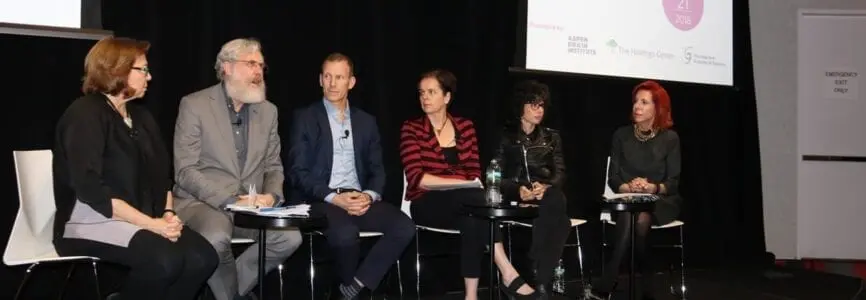Hastings Center News
Should We Pursue Genetic Cognitive Enhancement?
That was one of the many questions explored at a public event at the New York Academy of Sciences on May 21, cosponsored by The Hastings Center, the Aspen Brain Institute and the New York Academy of Sciences. “The Enhanced Human: Risks and Opportunities” examined existing and emerging enhancement technologies, with a special focus on gene editing and artificial intelligence as examples of technologies with broad capabilities and ethical concerns.
Hastings Center President Mildred Z. Solomon moderated the event. Panelists were Josephine Johnston, The Hastings Center’s director of research; George Church of Harvard University; Jamie Metzl of the Atlantic Council; and Meredith Whittaker of the AI Now Institute and Google Open Research. Watch the video of the event.
Now it's on to the panel discussion where we can really dig into #EnhancedHuman ethics. Moderated by Mildred Z. Solomon of the @hastingscenter, panelists will be @bioethicsjosie, @geochurch, @JamieMetzl & @mer__edith, with some additional commentary from Glenda Greenwald. pic.twitter.com/rFPhnGgFsZ
— NYAS (@NYASciences) May 21, 2018
“We live in an age of extraordinary scientific and technical prowess,” said Solomon in her opening remarks. “We can now literally change our own species, and cheaply and relatively easily mix DNA from across species to develop new forms of life. Neuroscience is advancing, and new brain-machine interfaces are emerging. Artificial intelligence has leapt forward and is mixing with many new biomedical technologies, creating powerful synergies.
“Many of these discoveries are awe-inspiring and offer tremendous promise. But we also need to think about what kind of society do we want to build with these awesome new powers? What virtues and values should we aim to preserve in human relationships and in humans’ relationships to nonhuman animals and plants in the natural world?”
George Church, a geneticist, predicted two areas where genetic technologies are likely to lead to human enhancements: improving memory and other cognitive functions and reducing the decline associated with aging. These enhancements will be extensions of treatments developed to control diseases — for example, treatments for dementia that are taken by healthy people to enhance memory.
Building on Church’s prediction, Jamie Metzl, a science fiction writer and lawyer, envisioned society becoming increasingly comfortable with human enhancement. For example, as screening embryos for genetic markers of disease becomes more common, people will eventually want to screen embryos for genetic markers associated with IQ and other traits considered desirable.
Listening to @JamieMetzl at @NYASciences … “Not only will IT power genomics revolution, but we ourselves are going to see humans for what we are — made of code. Readable, writable, and hackable.” #EnhancedHuman #risksandopportunities pic.twitter.com/N5elq0aD7d
— Sheryl Tierney (@the_s_tierney) May 21, 2018
In a talk titled “Not My Utopia: Freedom, Diversity, and the Ethics of Enhancement,” Johnston distinguished between enhancements that prevent disease, such as vaccines, and those that “touch on identity,” including traits seen as disabilities. She called for more attention to the social determinants of health and well-being.
“In my utopia we are all enhanced to be better than well, such as from vaccines, so as to not unnecessarily suffer from diseases. Where things become more complex is when there are enhancements that alter our cultural identities and more.” – @bioethicsjosie #EnhancedHuman pic.twitter.com/UfJ7Lc0Jb2
— NYAS (@NYASciences) May 21, 2018
“I find some enhancements laudable and necessary, such as helping our children to be kinder and smarter than their parents, but these are likely solved with social, political, and economic advances, as opposed to biotechnological enhancement.” @bioethicsjosie #EnhancedHuman
— Hastings Center (@hastingscenter) May 21, 2018
Whittaker spoke about artificial intelligence, focusing on what she called its “dark side.” She cited emerging technologies that enable you to “control your devices with your mind,” without having to speak or type. If your devices can read your private thoughts, she asked, “Who owns your thoughts?” Questions such as that one, which are at the core of humanity, raise other questions about AI: that it contains biases and inaccuracies that reflect the views of those with the power to develop AI. “The people in power get to define what is normal,” she said. Given that notions of normality change over time – think the prevailing view years ago that homosexuality was an illness — she emphasized the need for society to ensure that AI has the capability to keep reassessing what is normal.
.@mer__edith: AI progress is dependent on the current tech industry ecosystem. Only 7 or so companies dominate the field, those with 1) vast computational power 2) $$ for top developers 3) huge amount of data/market reach #EnhancedHuman @NYASciences @hastingscenter AspenBrainInst pic.twitter.com/GGKVl9rVUb
— M Brickman Borchard (@MBrickmanPhD) May 21, 2018
Watch the presentations and the lively Q&A.
Listen to Josephine Johnston and Mildred Solomon discuss the event in this Hastings Conversations podcast.

